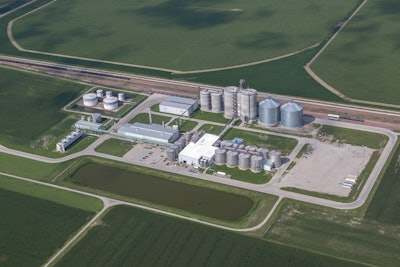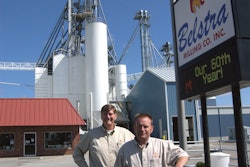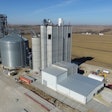
Flint Hills Resources announced today it will invest more than $50 million in its Fairmont, Neb. ethanol plant to install a new technology that will produce a high protein animal and fish feed ingredient from a portion of the plant’s distiller grains, a co-product of ethanol production. The project is one of the largest investments in co-product upgrading technologies ever made by a dry mill ethanol manufacturer.
The new patented technology, called Maximized Stillage Co-Products (MSC), was developed exclusively for the dry mill ethanol industry by Fluid Quip Process Technologies. The Fairmont plant will be just the fourth – and, to date, the largest – ethanol plant in the world to deploy the proven technology.
“MSC is an innovative, bolt-on technology that separates and upgrades a portion of distillers grains into a cost-competitive, high protein feed ingredient intended to help meet the growing need for protein in feed rations around the world,” said Kevin Karasiuk, plant manager at Flint Hills Resources Fairmont. “The technology provides an exciting new platform for Flint Hills Resources to compete in the alternative protein feed ingredient market.”
The Fairmount MSC project will require significant construction including the addition of a new building and two protein dryers. Construction is expected to begin in the spring and will last about 12 months. The project is expected to create about 120 construction jobs. The plant will remain in operation during construction.
The Flint Hills Resources Fairmont plant buys 42 million bushels of corn annually to produce 120 million gallons of ethanol, 310,000 tons of distillers grains and nearly 20 million pounds of distillers corn oil. The plant employs about 60 people.
Fluid Quip Process Technologies will provide the MSC technology, separation equipment, process engineering, construction oversight, and startup support for the Fairmount system.
MSC Leverages Proven Technology
Fluid Quip Process Technologies developed the MSC technology by leveraging years of experience in the corn wet mill and ethanol industries to provide innovative solutions for dry mill ethanol facilities. The technology uses a series of mechanical processes to separate protein from the solids leftover after ethanol distillation. Centrifuges are used to isolate protein molecules from residual fiber and carbohydrates. Once the protein is isolated, it is sent to a protein dryer where it is dried into a fine powder. The drying process is essential to ensuring the high-quality of the protein product.
“MSC leverages proven technology to provide a path for dry mill ethanol manufacturers to upgrade their co-products stream while enhancing plant ethanol and corn oil operations,” said Neal Jakel, vice president of strategy and technology at Fluid Quip Process Technologies. “Our goal when we developed the MSC technology was to help ethanol plants produce higher value co-products by isolating valuable components within the corn kernel. MSC helps ethanol producers to better diversify their revenue stream by entering new and quickly growing feed markets worldwide. In turn, this provides ethanol producers a competitive edge in the feed ingredients market. We are excited to work with Flint Hills Resources to install MSC at the company’s Fairmont ethanol plant.”
A Cost-Competitive and Nutritious Alternative to Traditional High Protein Feeds
The high protein feed produced using MSC is a combination of corn gluten (protein) and spent yeast. It has an improved amino acid profile when compared to corn gluten meal produced at corn wet mills while also having a higher protein concentration than spent yeast alone. The MSC-produced feed will have at least 48 percent protein making it an excellent ingredient for the aquaculture, pet food and poultry industries among others. The feed has comparable shelf life to corn gluten meal and soybean meal and can be stored in silos or distributed through various transportation modes including bulk packaging and containers for export. Flint Hills Resources will market the high protein feed as NexPro™ protein ingredient.
“There is growing demand for protein in the world,” said Mark Kruse, general manager of grain and feed ingredients at Flint Hills Resources. “Industries such as aquaculture and poultry are looking for additional sources of protein to supplement the diets of their fish and birds. NexPro will expand producers’ choices in the market and provide them with a higher value product than other high protein feed ingredients. We are eager to introduce producers to the benefits of NexPro and begin working with them to satisfy their protein needs.”
In addition to its high protein content, NexPro is expected to have about 3.5 percent crude fiber, 4.5 percent fat and 1.1 percent phosphorus. The feed also contains yeast leftover from the ethanol fermentation process. The remaining yeast contains lysine – an important amino acid essential for growth in animals – giving the product more total lysine than traditional corn gluten meal.
Flint Hills Resources and Fluid Quip Process Technologies have conducted over fifteen NexPro feed studies with independent and well-respected university researchers to demonstrate value in tilapia, trout, shrimp, dairy, swine and poultry. The results of these studies have shown NexPro to be an excellent source of nutrients in the diets of these animals.

















